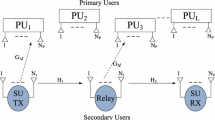Abstract
This paper investigates the impact of co-channel interferences (CCIs) caused by the external terminals over multiuser bi-directional amplify-and-forward (AF) relaying. The investigation considers multiuser pair and single bi-directional AF based relay and finite numbers of external interference terminals in the system model. Simultaneous transmission model, which is default mode, creates CCIs that is caused by the other user-pairs (internal terminals) in the system model. The opportunistic source-pair selection (OSPS) strategy achieves near-optimal solution for the internal CCIs challenge and also achieves diversity order in high SNR regimes. However, external terminals’ CCIs are inevitable and degrades the system performance. The main aim of this paper is to clearly state the impacts of external CCIs both for simultaneous and OSPS methods. According to the simulation results, in the case that the external terminals’ transmit powers are identical and non-identical to each other, and if the external terminals’ transmit powers are proportional with SNR, this results on the degradation of the achievable diversity order from \(N\) to 0 while also affecting the coding gain. The results also show that, when the external terminals have fixed transmit power values rather than proportional with SNR, in this circumstance, external terminals interference does not affect the achievable diversity order but it affects the system coding gain.The results also show that, when the number of external terminals which affect the user-pairs and relay terminals increase, for both identical and non-identical cases, the losses at the system coding gain exponentially decay. On the other hand, if the external terminals have non-identical transmit powers and if the relay terminal is interfered with more transmit power in comparison with what interferes with the user-pairs, this gives better performance values.











Similar content being viewed by others
References
Katti, S., Gollakota, S. S., & Katabi, D. (Aug. 2007). Embracing wireless interference: Analog network coding. ACM SIGCOMM, 07, 397–408.
Kim, S. J., Mitran, P., & Tarokh, V. (2007). Performance bounds for bi-directional coded cooperation protocols. In 27th International conference on distributed computing systems workshops, 2007 (ICDCSW ’07) (p. 83), 22–29 June 2007. doi:10.1109/ICDCSW.2007.109.
Esli, C., & Wittneben, A. (2008). One- and two-way decode-and-forward relaying for wireless multiuser MIMO networks. In IEEE global telecommunications conference, 2008 (IEEE GLOBECOM 2008) (pp. 1–6), Nov. 30 2008–Dec. 4 2008. doi:10.1109/GLOCOM.2008.ECP.765.
Joung, J., & Sayed, A. H. (2010). Multiuser two-way amplify-and-forward relay processing and power control methods for beamforming systems. IEEE Transactions on Signal Processing, 58(3), 1833–1846. doi:10.1109/TSP.2009.2038668.
Chen, M., & Yener, A. (2009). Multiuser two-way relaying: Detection and interference management strategies. IEEE Transactions on Wireless Communications, 8(8), 4296–4305. doi:10.1109/TWC.2009.081165.
Chen, M., & Yener, A. (2010). Power allocation for F/TDMA multiuser two-way relay networks. IEEE Transactions on Wireless Communications, 9(2), 546–551. doi:10.1109/TWC.2010.02.090336.
Ozduran, V., Cioffi, J. M., & Yarman, S. B. (2013). Opportunistic source-pair selection (OSPS) method for multiuser bi-directional wireless relaying networks. In IEEE 14th workshop on signal processing advances in wireless communication (IEEE SPAWC 2013), 16–19 June 2013, Darmstadt, Germany.
Ikki, S. S., & Aissa, S. (2012). Performance analysis of two-way amplify-and-forward relaying in the presence of co-channel interferences. IEEE Transactions on Communications, 60(4), 933–939. doi:10.1109/TCOMM.2012.013112.110188.
Benevides da Costa, D., Ding, H., Yacoub, M. D., & Ge, J. (2012). Two-way relaying in interference-limited AF cooperative networks over Nakagami- m fading. IEEE Transactions on Vehicular Technology, 61(8), 3766–3771. doi:10.1109/TVT.2012.2208773.
Yang, L., Qaraqe, K., Serpedin, E., & Alouini, M.-S. (2013). Performance analysis of amplify-and-forward two-way relaying with co-channel interference and channel estimation error. IEEE Transactions on Communications, 61(6), 2221–2231. doi:10.1109/TCOMM.2013.032713.120719.
Liang, X., Jin, S., Wang, W., Gao, X., & Wong, K.-K. (2012). Outage probability of amplify-and-forward two-way relay interference-limited systems. IEEE Transactions on Vehicular Technology, 61(7), 3038–3049. doi:10.1109/TVT.2012.2201514.
Soleimani-Nasab, E., Matthaiou, M., Ardebilipour, M., & Karagiannidis, G. (2013). Two-way AF relaying in the presence of co-channel interference. IEEE Transactions on Communications, 99, 1–14. doi:10.1109/TCOMM.2013.053013.120840.
Mandpura, A. K., Prakriya, S., & Mallik, R. K. (2013). Outage probability of amplify-and-forward two-way cooperative systems in presence of multiple co-channel interferers. In 2013 National conference on communications (NCC) (pp. 1–5), 15–17 Feb. 2013 doi:10.1109/NCC.2013.6487961.
Hemachandra, K. T., & Beaulieu, N. C. (2012). Opportunistic scheduling in dual-hop multiuser relay networks in the presence of co-channel interference. In 2012 IEEE global communications conference (GLOBECOM) (pp. 4635–4640), 3–7 Dec. 2012. doi:10.1109/GLOCOM.2012.6503850.
Acknowledgments
Special Thanks for the Stanford University, Dynamic Spectrum Management (DSM) Research group members for their valuable comments regarding improving the quality of this paper. This work is supported by the Istanbul University Scientific Research Projects Council with Grant Numbers 16359 and 21561.
Author information
Authors and Affiliations
Corresponding author
Rights and permissions
About this article
Cite this article
Ozduran, V., Yarman, S.B. Impact of the External Co-channel Interferences Over Multiuser Bi-directional Wireless Relaying Networks-Part I: System Description and Outage Analysis. Wireless Pers Commun 78, 1277–1295 (2014). https://doi.org/10.1007/s11277-014-1817-9
Published:
Issue Date:
DOI: https://doi.org/10.1007/s11277-014-1817-9




